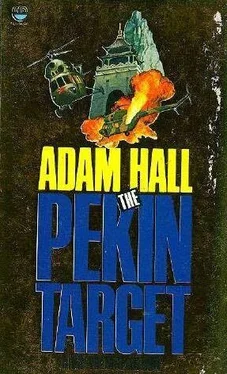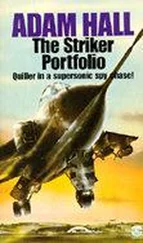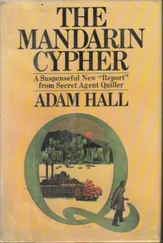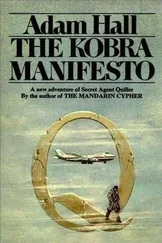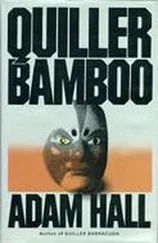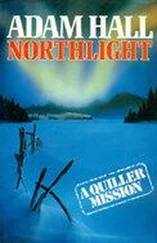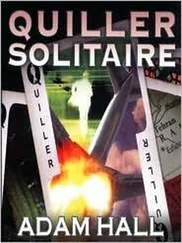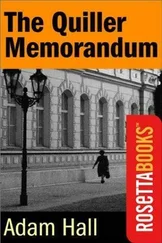In terms of driving-time Kimpo Airport was about halfway between Karibong-ni and the British Embassy in Seoul so as soon as we left the temple I asked Li-fei to stop at the nearest service station with a telephone; then I called the number Youngquist had given me in the subway this morning.
I recognised his voice when he came on the line, but we went through a double code-intro routine to make absolutely sure; then I told him I wanted a rendezvous with the director in the field, fully urgent, in the departure lobby on the third floor of Kimpo Airport half an hour from now. He didn't ask any questions and he wouldn't have got any answers if he had; nor was there any doubt that Ferris would be there on time: apart from a few hundred other things, your director in the field is required to make himself immediately available to you at whatever hour of the night or day; the executive is his sole charge and his sole responsibility.
I rang off and went back to the car.
Li-fei didn't say a word all the way to the airport; I think our meeting with the priest had brought the whole thing back to her: this was the time when the sleepless nights would begin, when she'd lie awake and wonder where things had gone wrong for her brother, and whether she could have tried harder to keep him out of trouble, away from Tung Kuo-feng's deadly influence. Nothing would have stopped him, she had told me, and I shall never know why.
She pulled up at the entrance to the terminal building and looked at me and asked: "Will you need me any more?"
"No."
"You must be very careful."
"Yes," I said, "I'll be careful."
I was looking for Ferris but couldn't see him.
"What will you do," Li-fei asked me, "when you find Tung?"
"I don't know."
"Will you arrest him?"
"Something like that."
"Or kill him?"
"I really don't know."
"Whatever you do to him," she said in a small cold voice, "let it be also for my brother."
I got out and she drove away and I watched as she made the turn, with the bright overhead lamps throwing their light across the pale china-doll face at the driving window; then I turned and went through the main doors and took the stairs to the third floor, walking with my head down and turned slightly towards the walls, because they were out there somewhere and ready to try again the moment they picked up my trail.
You'd think my instinct to survive was adequate, but now there was something extra I wanted to live for: if they were going to finish me, let it not be yet, because now I'd got something to do; grant me, 0 Lord, at least the luck of a street dog, and let me endure.
Third floor, because there were fewer people up here and all of them going one way. Two stairwells, exit report gates, two shops, airlines VIP lounge and toll waiting rooms. A group of five Japanese in light summer suits, all men and bowing to one another with punctilious regularity; two China Airlines flight attendants hobbling on high-heeled shoes; a black-uniformed chauffeur escorting a small European boy as far as Gate Three. There was no one else here: this was between flights. Through one of the windows I could see the wink of a beacon and the yellow glitter of the city to the north-east, and headlights along the highway.
Ferris late, discount, traffic problems, look at the gift shop window, what lovely plastic Buddhas.
Are you sure? Ferris would ask.
The map was in my pocket.
I'll have to signal London.
Of course. Tell Croder. Cheer the bastard up.
What pretty Japanese fans.
Get here. For Christ's sake just get here. All I ask.
A big jet came in with a thump and I saw lights flickering across the windows. Nine seventeen on the clock. But there is absolutely no point in watching the headlights. Youngquist understood the message and the message was ultra priority and he knew that: when you're operational and you use a telephone to your director or a contact it doesn't matter which telephone you use, it's a hotline.
Two heads floated against the glass of the window, bobbing up from the stairwell behind me and moving across the pantomime masks, a man and a woman; I heard their voices, half lost in the whistle of the jet as it came in towards the parking bay.
Others came, their heads appearing above the stairhead and turning, floating across the row of masks while I watched them, one of them not turning but growing larger and facing in this direction, pink and sandy and with glasses catching the light, bringing me back to a world where a future was possible again, "Bit of a jam leaving the city," he was saying.
I turned round and said: "I've got access."
He opened his mouth to say something but thought better of it for some reason and just stood watching my face as if he was trying to see if I really meant it.
"Access to Tung Kuo-feng," I told him. "I know where he is."
He glanced around and asked me, "Why the airport?"
"It would have taken me another half hour to get to the city."
"Is time critical?" I didn't answer, and it took him a full second to get it all straight. "Sorry."
"I should bloody well think so." It had taken me four days of murderous pressure to get here with what they wanted, and he'd wondered why there was suddenly such a rush.
"Are you sure enough," he asked me, "for me to let them know?"
"You can put through an interim signal, in case they've got to take up any slack in the system."
He nodded and we went down the stairs and he used one of the phones near the post office on the second floor, giving it cold to Youngquist or the Embassy or whoever was near a radio: The executive in the field has access. Then he put me in the Embassy car and took the slip road for the highway and turned north-east, slotting into the traffic stream.
"Did you catch that leak?" I asked him.
"Yes."
"We're going to the Embassy?"
"Yes."
He smelled of soap.
"Who was it?"
He always smells of soap. He's always washing. They say he's guilty about something and I can believe that: there's something in his voice like the echo of a distant shot.
"A Korean clerk, handling host-country PR."
Everything coming up roses. Tonight nothing was going to go wrong. The mood was swinging wild now: I'd stood there watching the pretty Japanese fans and thinking my God they've got Ferris and he's not just late, he's dead, and so's the mission, and now the elation was coming in, and when I finally flew out of this bloody place I'd take one of those plastic Buddhas back for some poor sod at the office, preferably Croder.
"How did you get him?" I asked Ferris.
"Routine trap. We asked HE to say there was a suspected security problem, and checked everyone on the staff below second attache on their way home. This character had some papers on him, nothing classified but not his business."
A lot of the elation going, downswing now, but that was normal. "This man Tung," I said, "is just about everywhere."
"It might not have been Tung's man. In Asia there's a lot of intelligence mercs: they'll pass on whatever they can pick up, to whoever will pay most."
"There could be someone else," I said, "at the Embassy."
"No. I've been working all day on that: five trial rendezvous with Youngquist and three contacts, half of them by open phone and half over various radios in open speech, three languages, and no one ever turned up to survey. Youngquist took the skin off his feet."
"That's a shame."
"I thought you'd like that."
When the lights of downtown started swinging overhead I told him about the priest and he listened for ten minutes without interrupting before he asked:
"Is he sure?"
"Yes. I told him that lives depended on it, and he said he could believe that, because he knew what kind of man Tung was, and he knew I was an agent opposing him."
Читать дальше
